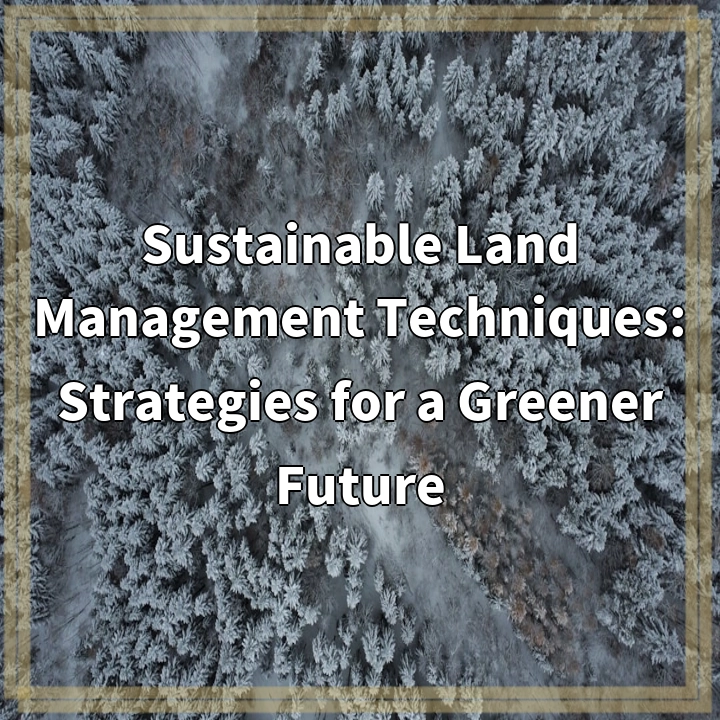Physical Address
304 North Cardinal St.
Dorchester Center, MA 02124
Physical Address
304 North Cardinal St.
Dorchester Center, MA 02124

Sustainable Land Management (SLM) encompasses a comprehensive approach to managing land resources to meet societal needs while preserving the environment. It integrates practices that promote land productivity and resilience, ensuring that current and future generations can thrive. SLM involves a balance between economic, social, and environmental considerations, employing techniques such as agroforestry, crop rotation, sustainable grazing practices, and soil conservation methods.
The fundamental principles of SLM include maintaining soil health, enhancing biodiversity, managing water resources efficiently, and reducing the impact of land use on ecosystems. Adopting these practices allows for the long-term sustainability of land resources, yielding benefits such as improved food security, reduced desertification, and enhanced climate resilience.
Despite its potential benefits, implementing Sustainable Land Management techniques faces several real-world challenges. These issues stem from a variety of socio-economic and environmental factors that hinder the adoption of sustainable practices.
In many regions, unsustainable agricultural practices, deforestation, and urbanization have led to significant land degradation and desertification. These problems reduce the land’s productivity, making it difficult for communities to sustain themselves and often resulting in food insecurity.
Farmers and land managers may lack the financial resources and access to technology needed to implement sustainable practices. Initial investments in sustainable methods can be high, deterring small-scale farmers from adopting these techniques despite their long-term benefits.
Climate change intensifies challenges related to land management, including altered precipitation patterns, increased frequency of extreme weather events, and shifting agricultural zones. These changes can jeopardize the success of SLM initiatives and exacerbate existing land management issues.
Inconsistent policies and ineffective governance at local, national, and international levels can undermine sustainable land management efforts. Without the right legal framework and enforcement mechanisms, sustainable practices may not be adopted or maintained, leading to further degradation and unsustainable land use.
Many land users are unaware of the benefits of sustainable land management techniques or do not have access to education and training. Increasing awareness and building capacity are essential to empower communities to adopt and maintain sustainable practices effectively.
In summary, while Sustainable Land Management offers an array of strategies for fostering land productivity and environmental stewardship, various global challenges complicate its implementation. Addressing these barriers through education, economic support, and improved governance is crucial for fostering a sustainable future.
To effectively address the challenges associated with Sustainable Land Management (SLM), a multifaceted approach is necessary. Encompassing education, policy reform, and financial investment, these solutions aim to promote the adoption of sustainable practices and foster resilience within communities.
Implementing educational initiatives targeting farmers and land managers can significantly increase awareness about the benefits of SLM practices. Workshops, training sessions, and community outreach programs can provide valuable information and practical skills, empowering land users to adopt sustainable techniques effectively.
Offering financial assistance, such as grants, loans, and subsidies, can help ease the initial cost burden of transitioning to sustainable practices. Incentive programs that reward farmers for adopting eco-friendly methods can further encourage the integration of SLM techniques in agricultural operations.
Strengthening legal frameworks and promoting effective governance are crucial for the successful implementation of sustainable land management. Policies should support sustainable land use, provide clear guidelines, and ensure that land users have access to resources that facilitate SLM practices. Collaboration between governments, NGOs, and local communities is essential for achieving these goals.
Investing in research and development of sustainable technologies can lead to innovative solutions for land management challenges. Encouraging partnerships between governments, academic institutions, and private sectors can foster the development of tools and techniques that enhance agricultural productivity while protecting ecosystems.
Involving local communities in decision-making processes is vital for the success of SLM initiatives. By recognizing and integrating traditional knowledge and practices, land management strategies can be more effective and culturally relevant, leading to increased buy-in and sustainability.
In summary, addressing the challenges of Sustainable Land Management requires a collaborative effort focused on education, financial support, policy reforms, technological advancement, and community engagement. By implementing these solutions, society can work towards a more sustainable and productive use of land resources.
Sustainable land management contributes to the preservation of ecosystems and biodiversity. It supports the livelihoods of communities, improves food security, and enhances climate resilience. By adopting sustainable land management techniques, we can create a greener future for generations to come.
If you’re wondering where the article came from!
#